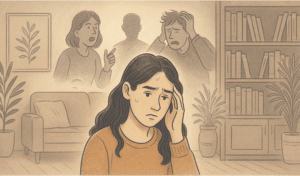Having a panic attack is a really rough experience, and everyone experiences them differently. If your partner has anxiety but you don’t, it can be difficult for you to know how to help them when they are in the middle of an anxiety attack. It’s not an experience that can always be relayed or explained, there isn’t always a tangible reason for the anxiety, and not every single one feels or plays out the same as the last one. So, how can you help your partner when they’re having an anxiety attack?
Listen
Dealing with an anxiety attack is something that you will become better at as time goes on. Listen to them and what they’re able to tell you they need, if they’re able to at all. For some people, they need to be held and reassured. Others don’t want any sort of physical touch during an attack. You can ask them what you can do to help during the attack, but if they are unsure or unable to relay what they need, then you can simply stay nearby and offer your presence until things start to improve.
Try to communicate openly
After a panic attack is over, you can ask your partner what you could’ve done to help more, if the things you did were helpful, and just talk things through. Having an anxiety attack in front of someone else can be incredibly embarrassing and vulnerable, so be gentle with them as you try to communicate about their needs and their experience.
Some helpful tips
Again, everything varies person to person. What helps one person doesn’t help another. But here are a few ideas that you can try and discuss with your partner.
-Change of temperature. Putting something really warm or really cold into their hands can help.
-Introducing a comforting smell. Some people have a certain candle that reduces anxiety, or something similar to this.
-Rub their hands, feet, or neck, to release tension and help their body relax.
-Say calming and reassuring things to them.
-Breathe deeply. They may have a hard time controlling their breath, and may hyperventilate. Having a calming, deep breath to listen to can help calm them down and regulate their own breathing.
-Hold them. Sometimes this can help them feel safe and protected.







